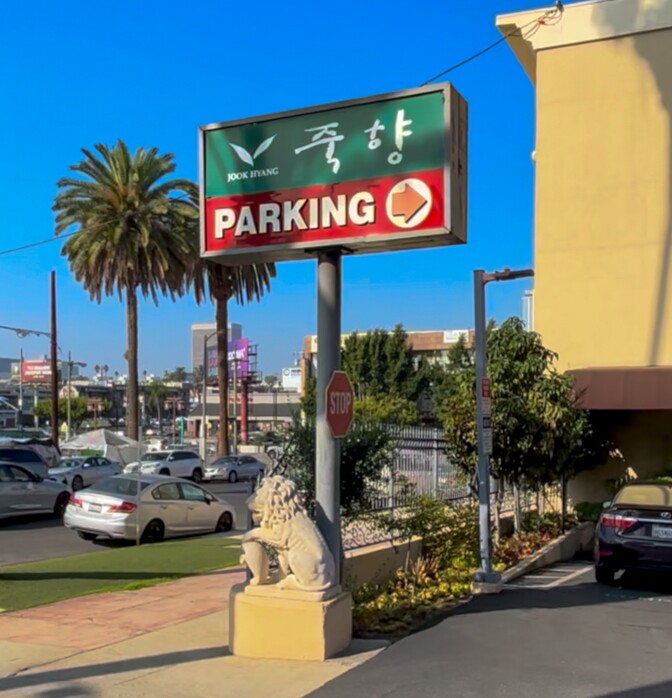Imagine a vegetable with the hype of a limited edition sneaker drop, but with nature controlling the supply chain.
That would be the wild pine mushroom (in Korean, songi beoseot), which grows only beneath red pine trees that are more than 20 years old, requiring precise soil, humidity and temperature conditions. Their brief harvest window — a few weeks each September and October — and restricted growing areas create a scarcity that makes them legendary among foragers and chefs.
The prized funghi adds a floral, woodsy character that’s highly sought after in Korean cuisine; in the same way Europeans go crazy for black truffles, these mushrooms have been a luxury status symbol in Korea for centuries.
Traditional Korean home-style cooking
I learned about this legendary wild pine mushroom, and Jook Hyang, a restaurant in Koreatown that’s currently serving them, from a TikTok video. I was curious, and decided to visit.
The restaurant is located a few blocks from the intersection of Olympic Boulevard and Vermont Avenue, ground zero for all things happening in K-town.
@jookhyang 🍄 LIMITED TIME NATURAL PINE MUSHROOM MENUS available now! 🌿 In Koreatown LA, Jook Hyang serves unique and healthy traditional Korean food. ⛰️ Natural Pine mushrooms are a rare delicacy known for their earthy, aromatic taste. 😋 From Sliced Natural Pine Mushrooms and Pine Mushroom Pancakes to Natural Pine Mushroom Samgyetang and Dolsot Bibimbap, enjoy this piney flavor that can only be eaten once a year! 🌟 Send this to someone who needs to try this asap! ⏰️ Open every Monday - Saturday, 7am - 9pm 📍Jook Hyang 2666 W Olympic Blvd Suite #116 Los Angeles, CA 90006 @jook.hyang #HealthyKoreanFood #LAfoodie #KoreanFoodLovers #LArestaurants
♬ original sound - Jook Hyang
Driving into the back parking lot off the small block of Menlo Avenue, you'll be greeted by a uniformed security guard who will wave you into one of many free parking spots. Yes, you read that right: a free enclosed parking lot in Koreatown, a true unicorn in Los Angeles.
Making your way up a small flight of stairs to the entrance, you'll find a modest dining space that genuinely feels like a Korean grandmother's house — minimally decorated with a few booth seats and tables with vinyl backing in the center. Small shelves display boxed Lebubus for sale next to rows of large ginseng roots preserved in Costco-branded Kirkland Signature vodka bottles (a method to protect their freshness, I learned later) and a small refrigerator of homemade kimchis. I definitely felt like I was in the right place.

As I took my seat, a slow, steady stream of customers — mostly Korean septuagenarians and above — began to pour in. They looked as if they'd been coming here for years — always a good sign.
The pine mushroom experience
Pine mushrooms have been prized in Korea, and elsewhere in Asia, for at least 600 years, when they were treasured gifts among the aristocracy. Today, they arrive during Chuseok, Korea's major harvest festival, a three-day holiday that brings families together to honor ancestors, share feasts and tend to ancestral graves — making these rare mushrooms part of a significant cultural moment.
Despite their significance in Korea, these mushrooms aren't geographically exclusive to the country. They’re also found at high altitudes in the U.S. and Europe, though their short harvest season makes them challenging to farm commercially.
What was ordered
The restaurant had a special section of the menu dedicated to songi beoseot, with dishes priced accordingly, from $30 to as much as $90.
There was everything from minimalist porridge to opulent samgyetang (ginseng chicken soup with abalone) and galbi jjim (braised short ribs). I opted for the galbi jjim with abalone, a luxurious take on the classic that arrives sizzling in a black stone pot, crowned with thick mushroom slices and surrounded by a parade of banchan — kimchi, pickled radish, seasoned spinach and cilantro salads.
The short ribs were braised until they nearly collapsed under a spoon, with their glossy soy-based sauce infused with the delicate, almost blossom-like scent of wild mushrooms. After all the lead-up, I have to confess that while I was highly impressed with the dish — the briny sweetness of the abalone playing beautifully against the earthy richness of the beef — I found the mushroom taste quite subtle. The other components took center stage, while the mushroom played second fiddle, making it difficult to savor.
I also couldn't resist ordering a plate of the glistening soy-marinated raw crab, which you eat with your hands using a supplied plastic glove. Full disclosure: this wasn’t a dish that came with the mushrooms, but I’d been dying to try them once I saw they were on the menu. However, they did arrive with a complimentary platter of raw-sliced mushrooms dressed with red gochujang sauce and sesame seeds. The crabs are savory and just lightly funky in all the right ways — hearty yet restrained, indulgent but not heavy.

I may have come for the mushrooms, but I stayed for the cultural immersion. What strikes me most about Jook Hyang isn't just the rare mushrooms or the improbable free parking — it's the quiet preservation of something increasingly hard to find in K-town's polished dining scene. This is a place where generational knowledge lives on, both in the kitchen and among loyal regulars. I arrived as an outsider, chasing a TikTok tip about scarce fungi, but left with a deeper appreciation for how traditional Korean home cooking serves as a bridge between cultures.
If you're tempted to go, don't wait — the pine mushroom season is fleeting. That said, the homemade kimchi, comforting soups and that soy-marinated raw crab are all reasons to return year-round.














